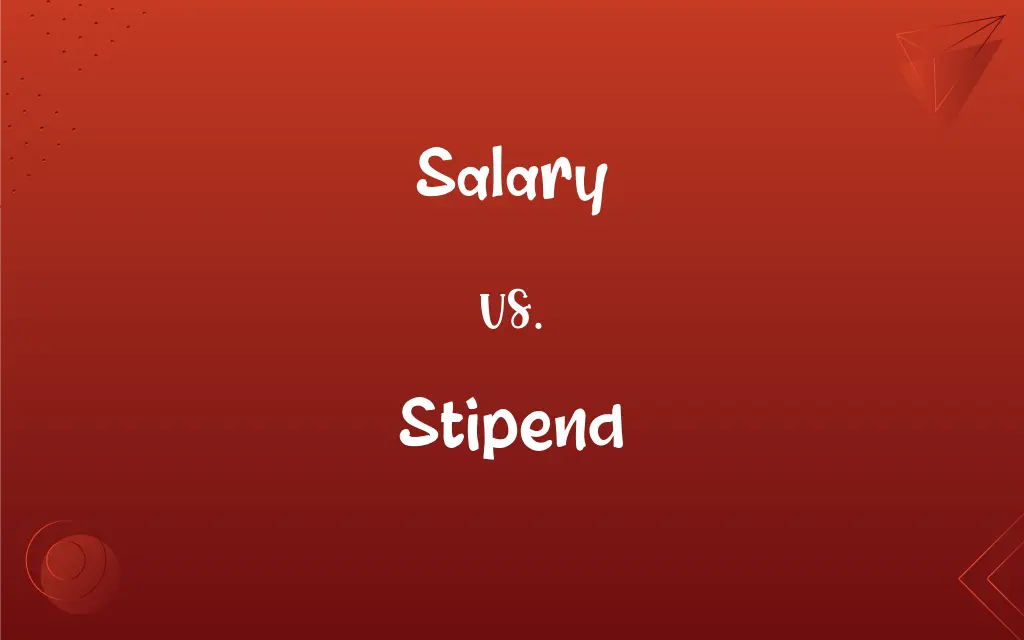Salary vs. Stipend: What's the Difference?
Edited by Aimie Carlson || By Harlon Moss || Updated on October 17, 2023
Salary is regular payment for work, typically monthly; stipend is a fixed, often modest, payment for a specific purpose or period.

Key Differences
Salary is a fixed regular payment, typically paid monthly or biweekly, in return for an employee's professional services. Stipend, on the other hand, is a fixed, regular sum of money given for services or to cover specific costs, often not based on hours worked.
Salary is typically associated with traditional employment where the amount often reflects the job's responsibilities and the employee's experience. Stipend is commonly provided to interns, clerics, or graduate students and is not necessarily compensation for work done.
Salary often comes with additional benefits like health insurance, retirement benefits, or paid vacation. Stipend, being a modest amount, typically doesn't include such benefits and might be given tax-free.
Salary serves as the primary source of income for most salaried employees and forms the basis of their financial security. Stipend serves a different purpose, primarily helping recipients offset specific expenses rather than acting as a primary income source.
Salaries are negotiated based on job roles, market rates, and individual qualifications, usually aiming to be competitive in the job market. Stipends are generally predetermined, often standardized for similar roles, and aren't always meant to be competitive or substantial.
ADVERTISEMENT
Comparison Chart
Nature
Regular payment for work
Fixed payment for a specific purpose
Typical Recipients
Traditional employees
Interns, clerics, graduate students
Benefits
Often includes health, retirement, etc.
Rarely includes additional benefits
Primary Purpose
Primary source of income
To cover specific expenses or support during training/education
Negotiability
Typically negotiable based on role and qualifications
Generally standardized and non-negotiable
ADVERTISEMENT
Salary and Stipend Definitions
Salary
A predetermined sum of money for an employee's services.
The company offered a competitive salary and benefits.
Stipend
A regular, fixed amount given for services or to meet costs.
The university provided a stipend for its research assistants.
Salary
Compensation given monthly or biweekly.
He received his salary on the last day of every month.
Stipend
Financial support often for education or training.
He received a stipend during his internship.
Salary
A regular payment for professional services.
Her salary at the new job was substantially higher than her previous one.
Stipend
Money given to offset specific expenses.
The stipend was meant to cover her housing and meals.
Salary
Financial reward for work or services rendered.
The teachers demanded a raise in their salary.
Stipend
Non-salary financial assistance.
Her fellowship came with a stipend to support her research.
Salary
Remuneration based on job roles and responsibilities.
CEOs often have a higher salary reflecting their leadership role.
Stipend
Modest payment not based on hours worked.
The clergyman received a stipend for his community services.
Salary
Fixed compensation for services, paid to a person on a regular basis.
Stipend
A fixed and regular payment, such as a salary for services rendered or an allowance.
Salary
A fixed amount of money paid to a worker, usually calculated on a monthly or annual basis, not hourly, as wages. Implies a degree of professionalism and/or autonomy.
Stipend
(archaic) A regular fixed payment made to someone (especially a clergyman, judge, soldier, or teacher) for services provided by them; a salary. 15
FAQs
What is a salary?
Salary is a fixed regular payment given to employees for their professional services.
Are salaries given weekly?
Salaries are typically given monthly or biweekly, though some jobs might offer weekly payments.
What purpose does a stipend serve?
A stipend provides financial support for specific purposes, often education or training.
Who commonly receives stipends?
Interns, graduate students, and clerics often receive stipends.
Do salaries come with additional benefits?
Yes, salaries often come with benefits like health insurance and retirement plans.
Is a stipend considered a salary?
No, a stipend isn't considered a salary; it's a fixed sum given for a specific purpose.
Can a salary be negotiated?
Yes, salaries can often be negotiated based on roles, market rates, and qualifications.
Are stipends taxable?
It depends on the nature and purpose of the stipend. Some may be tax-free while others are taxable.
Why do companies offer salaries?
Salaries compensate employees for their services, attract talent, and maintain job satisfaction.
Is a stipend a form of wage?
No, a stipend is distinct from a wage; it's a fixed sum, not based on hours worked.
Do internships always come with stipends?
Not always. Some internships are unpaid, while others provide stipends or even regular wages.
How frequently are stipends paid?
The frequency can vary, but stipends are often paid monthly or quarterly.
Is a stipend considered compensation for work?
Not always. Stipends might be for support or expenses, not necessarily as compensation for work done.
Can salaries decrease?
While uncommon, salaries can decrease due to economic downturns, company performance, or restructuring.
Can someone live off a stipend?
It depends on the stipend's amount and the individual's expenses. Some stipends are modest and only intended to cover specific costs.
Can a stipend act as a primary source of income?
Stipends are often modest and intended to offset specific costs, not to act as a primary income.
Can a job offer both a salary and a stipend?
Yes, some roles, especially academic or research positions, might offer a salary plus a stipend for specific expenses.
Do part-time employees receive a salary?
Part-time employees might receive a salary or hourly wages, depending on the employment terms.
How are stipend amounts determined?
Stipend amounts are often standardized for similar roles or based on the costs they're intended to cover.
Are all salaries the same within a company?
No, salaries can vary based on roles, experience, and qualifications.
About Author
Written by
Harlon MossHarlon is a seasoned quality moderator and accomplished content writer for Difference Wiki. An alumnus of the prestigious University of California, he earned his degree in Computer Science. Leveraging his academic background, Harlon brings a meticulous and informed perspective to his work, ensuring content accuracy and excellence.
Edited by
Aimie CarlsonAimie Carlson, holding a master's degree in English literature, is a fervent English language enthusiast. She lends her writing talents to Difference Wiki, a prominent website that specializes in comparisons, offering readers insightful analyses that both captivate and inform.































































